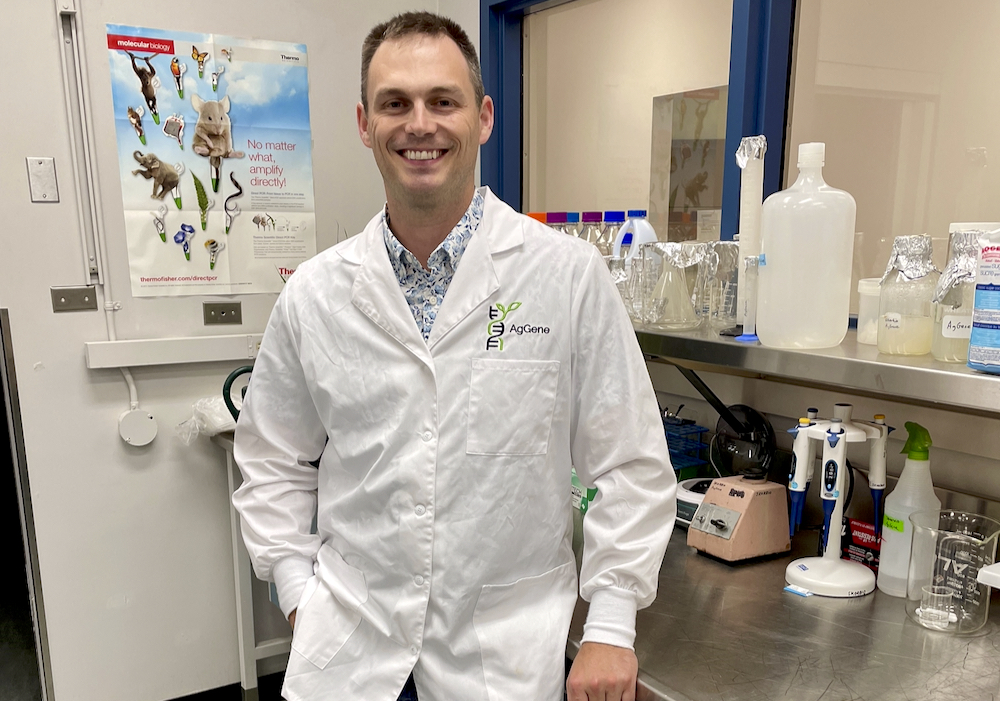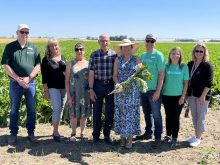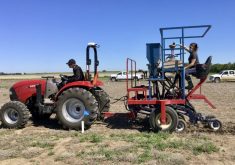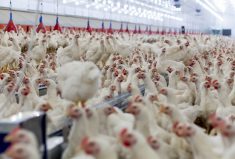A young Alberta plant scientist is using gene editing to develop high-protein crops with an eye on feeding underdeveloped countries and meeting food industry demand for plant-based protein.
Logan Skori grew up on an 1,800-acre mixed farming operation near Kinsella. His favourite childhood memory, which inspired his academic career, is riding in a combine with his father.
“I love harvest time,” said the 31-year-old. “To me, that was kind of the best part of the year. That was always the pinnacle of the season to me.”
Read Also

Innovation takes centre stage at record-breaking Ag Expo
Lethbridge event hits capacity with 326 global exhibitors showcasing the latest ag tech, innovation and the 129th North American Seed Fair.
After high school, he thought about going into medicine, but his curiosity about crops pushed him toward plant biology. He worked summers for Crop Production Services and Viterra and after getting his degree in plant biology, joined Nutrien as a crop advisor and salesperson.
“I got to know some of the guys heading up the innovation team at Nutrien,” he said. “I was always interested in what they had to say and what they were breeding and developing. That was one of the reasons why I decided to go back to school, and I ended up finishing my PhD in plant science this past April.”
But before graduating, and armed with a $200,000 grant from Innovate Calgary, he started Ag Gene in 2020 with the aim of increasing protein in canola, peas, soybeans and rice. He has already filed provisional patents on some of his ideas.
“We kind of had our ‘aha moment’ where we had developed some transgenic canola that had anywhere from 15 per cent to 20 per cent increase in crude protein content, and from there we obviously had to go back to the drawing board, as the regulatory landscape on GMOs is quite difficult to bring to life in a commercial setting,” he said.
“Ultimately we landed on using gene editing to basically make slight modifications to a DNA blueprint to help drive the amount of protein.”
Skori’s current focus is on canola and he has several groups interested in collaboration in hopes of starting field trials in 2023. In the end, his research is about feeding the world’s growing population.
“A lot of reports suggest that by the year 2050, the global demand for protein is expected to double,” he said. “Right now, there’s a bit of a stigma attached to protein sources from animals. People are starting to look at these alternative sources of protein.”
If Ag Gene can deploy a portfolio of high-protein seeds to market, it could give food manufacturers a chance to buy protein isolates at a lower cost, said Skori. He is interested in the humanitarian aspect of plant breeding and new agriculture technologies.
“When you look at the sheer protein deficiencies across the world, I think nearly a billion people every day don’t get enough protein in their diets,” he said. “When you start to think about solutions, to me one of the easiest and most practical solutions is developing high-protein seeds that can be distributed to people. Their life would depend on it.”
If Skori is successful in bringing high-protein seeds to market, there may be a benefit to farmers in terms of input costs, said market analyst Brennan Turner.
This year’s crop is the most expensive ever planted on the Prairies and crops engineered to produce more protein could result in less fertilizer use, he said.
“If I’m potentially using Ag Gene’s variety, maybe instead of putting 100 pounds of nitrogen down per acre, maybe I only need to use 50 pounds,” said Turner. “For the average farm that’s tens of thousands of dollars.”
Upping protein content in nitrogen-fixing pulses is another promising avenue, said Skori.
“If you can get more protein without synthetic fertilizer, that all of a sudden is a pretty hot topic, especially when looking at fertilizer prices and environmental impact.”
Answering the questions generated by Skori’s research will likely take years, said Turner, noting agriculture needs more innovators like him to place future farmers in a better position to succeed.
“People who come from the farm understand the dynamics of how the farm operates,” he said. “And this is where most of the plant biotechnology and innovation is coming from.
“In my opinion it’s coming from people who understand the soil, who understand plants, and are applying their education and knowledge to the problems they’ve experienced their entire lives.”
Farmers could benefit from canola varieties that boost protein and maintain oil content, said Chris Vervaet, executive director of the Canadian Oilseed Processors Association.
“The higher the protein, the higher the value of your crop,” he said. “But the same can be said for higher oil content, keeping in mind that factors like yield need to be considered as well. In a perfect world, we want it all. We want a canola that has high yields, high oil content and high protein content. We are always supportive of research that can check all those boxes.”















